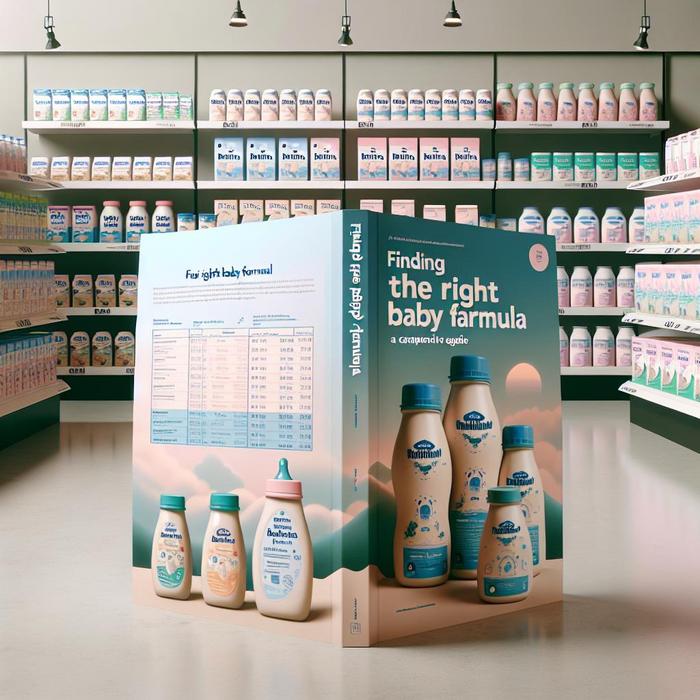Finding the Right Baby Formula: A Comprehensive Guide
Determining Your Baby’s Nutritional Needs
Before you set out to find the perfect baby formula, it’s crucial to have a firm understanding of your little one’s nutritional needs. Unlike adults, babies require different nutrients to support their fast growth and development. Your baby’s diet should consist of:
- Protein: Essential for growth and development
- Fats: Major source of energy and aids in brain development
- Carbohydrates: Supplies energy
- Vitamins and Minerals: To support growing bones and ensure a healthy immune system
In some cases, your baby might require a special diet due to medical reasons such as allergies, intolerance, or medical conditions. Always consult with your pediatrician before choosing a baby formula.
Choosing the Type of Baby Formula
When it comes to baby formulas, you have multiple options to choose from. The various types available include:
- Cow’s Milk-Based Formula: This is the most common type. It is made of cow’s milk that’s been altered to resemble breast milk.
- Soy-Based Formula: This is an alternative for babies who can’t tolerate cow’s milk. It’s made from plant proteins and might be recommended for babies with lactose intolerance.
- Hypoallergenic Formula: This type is for babies with allergies to milk or soy. The proteins in these formulas are broken down to smaller sizes to reduce the likelihood of an allergic reaction.
For more detailed advice on baby formulas, the CDC provides an excellent guide on choosing an infant formula.
Understanding Baby Formula Labels
Understanding what’s listed on a baby formula label is a crucial part of the selection process. This knowledge will empower you to choose a formula that meets the nutritional needs of your baby. Some of the things to look out for are:
- Ingredients: Check the list of ingredients. The first on the list is the highest in quantity. Most baby formulas begin with a source of carbohydrates, protein, and fat.
- Added Sugars: Ideally, opt for formulas with minimal added sugars. Excessive sugar can lead to obesity and tooth decay.
- Amino Acids: Amino acids are the building blocks of protein. Babies need 22 of them, 9 of which are essential and must be obtained from food.
Form of Baby Formula
Baby formulas come in three forms: powdered, concentrated liquid, and ready-to-use. Each type has its own advantages and drawbacks.
- Powdered Formula: This is the most cost-effective option, but it requires careful measuring and mixing.
- Concentrated Liquid Formula: This form needs to be mixed with an equal amount of water before feeding. It’s less messy than the powdered form, but slightly more expensive.
- Ready-to-use Formula: As the name suggests, this type doesn’t require any mixing. It’s the most convenient but also the most pricey.
Consult a Pediatrician
It’s advisable to discuss your chosen baby formula with your pediatrician. They can offer personalized advice based on your baby’s nutritional needs and growth development. For instance, your baby might need a formula with added iron if they’re showing signs of anemia. Or, if your baby is struggling with teething, your pediatrician might suggest a formula that’s easier to digest.
Remember, finding the right formula might take some trial and error. But once you find a formula that suits your baby’s needs, it can contribute significantly to their overall growth and well-being.
Comparing Different Brands
Not all baby formulas are created equal. You’ll find a range of different brands offering a variety of options. Some of the best-known brands include Similac, Enfamil, and Gerber, but there are many others to choose from, including organic brands. Each brand tends to have its own unique formulation, so it’s important to carefully compare the labels. Specifically look for:
- Added nutrients: Some formulas are enriched with omega-3 fatty acids, prebiotics, probiotics, or nucleotides, nutrients believed to boost your baby’s immune system and brain development.
- Certifications: If you’re looking for an organic formula, ensure the product is certified by a credible organization such as the USDA.
- Manufacturer reputation: Brands with a good reputation are more likely to maintain high-quality control standards.
While cost should be a factor in your decision, don’t compromise your baby’s health for the sake of saving a few pennies. Price does not always correlate with quality. If possible, ask your pediatrician or fellow parents for recommendations. You can also consult informative websites like milk-drunk.com for baby formula reviews.
Switching Baby Formulas
If your baby isn’t taking well to a new formula or is experiencing symptoms such as excessive spitting, gassiness, or fussiness, it may be necessary to switch to a new formula. But remember, don’t switch formulas at the first sign of distress. Babies often need time to adjust to new foods, so give it a few days unless the reactions are severe.
If you decide to change formulas, do it gradually. Start by replacing one feeding a day with the new formula and continue until all feedings are switched. This gradual method ensures your baby’s tummy doesn’t get upset by a sudden change.
Safe Preparation of Baby Formula
No matter what type of baby formula you choose, it’s extremely important that you prepare it safely. Mishandling formula can lead to bacterial contamination that can make your little one sick. Here are some safety tips to keep in mind:
- Always clean your hands before preparing bottles. Same goes for the bottles and all feeding equipment.
- Use water that is safe to drink for mixing the formula. If you use tap, boil it first for at least a minute and then let it cool down before adding the formula.
- Only prepare one bottle at a time and feed it to your baby immediately. Do not save leftover formula for later feedings as it can become contaminated. Follow the manufacturer’s instructions for discarding unused formula.
For comprehensive information about safe preparation and handling of infant formula, check out healthychildren.org.
Gauging Your Baby’s Response
Finally, carefully observe your baby’s reaction to the baby formula. Monitor their weight gain and growth progress. Are they satisfied after feedings? Look for signs of possible food allergies, like rashes, diarrhea, or a swollen face or lips. If your baby is colicky, speaks to your pediatrician – your little one may require a sensitive stomach or hypoallergenic formula.
Remember, your baby’s health and happiness are the best indicators when choosing the right baby formula. Always consult your pediatrician for professional advice tailored to your unique situation. For more advice on baby nutrition, see Cleveland Clinic.
By following this comprehensive guide and closely observing your baby’s reaction, you can navigate the process of finding the right baby formula with confidence.







